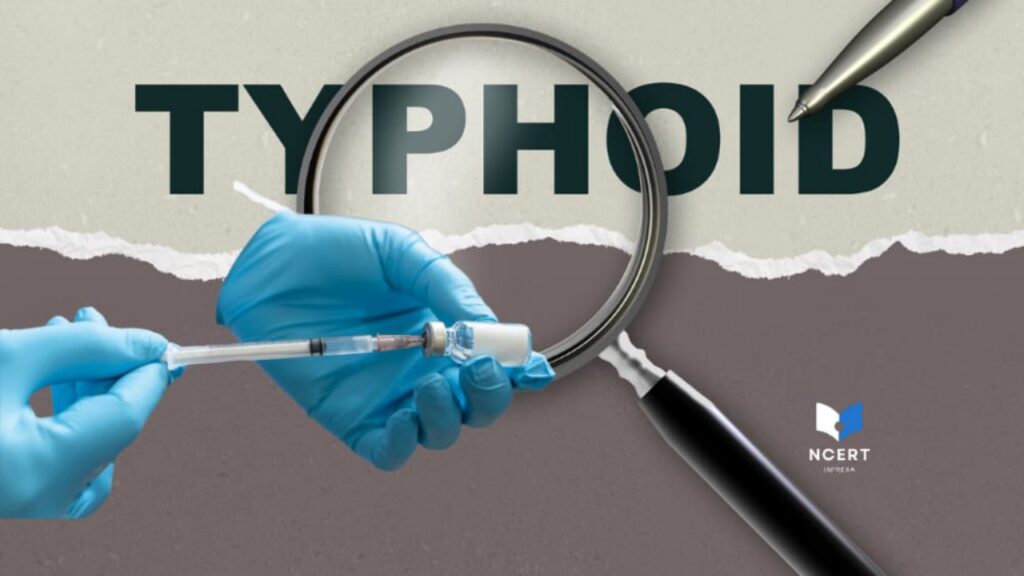Typhoid fever is caused by ingestion of food or water infected with the bacteria Salmonella typhi, or by close contact with a person infected with this bacteria.
Signs and symptoms of typhoid usually include high fever, headache, abdominal pain, and constipation or diarrhea.
Most people with typhoid fever begin to feel better within a few days of starting antibiotic treatment, although a small number of them may die from complications of typhoid. Typhoid fever vaccines are available, but they are not 100% effective.
Typhoid fever is rare in industrialized countries, but it remains a serious health threat in developing countries, especially for children.
Typhoid is quite common in India, where it is also known as Motijhara and intermittent fever (enteric fever). According to the World Health Organization, there are about 21 million typhoid cases worldwide every year and 2.22 lakh people with typhoid die.
Typhoid Symptoms
Symptoms of typhoid disease usually develop slowly – about 1-3 weeks after infection occurs.
The early symptoms of typhoid are (Once signs and symptoms appear, you are likely to experience):
- Fever – initially low and then increasing daily, possibly reaching 104.9 F (40.5 C)
- Headache
- weakness and fatigue
- muscle pain
- to sweat
- dry cough
- loss of appetite and weight loss
- stomach ache
- diarrhea or constipation
- rash
- excessive bloating in the abdomen
Post typhoid symptoms
If typhoid is not treated then these symptoms can occur:
- Get mad
- Going into a “typhoid state” – ie, being immobile, extremely tired, lying down with eyes half-open
Also, fatal complications often develop at this time.
In some people, symptoms may return up to two weeks after the fever has subsided.
How does typhoid spread
The typhoid bacteria live in the intestines and bloodstream of humans. It spreads to humans through direct contact with the feces of an infected person. This infection always passes from one human to another and does not reach humans from any animal.
If left untreated, typhoid kills 1 in 4 people, and it will be fatal in less than 4 out of 100 cases if treated.
Salmonella typhi bacteria enter the mouth and remain in the intestine for 1-3 weeks. After that, it goes through the intestinal wall into the blood. Through the blood, it spreads to other tissues and organs.
Your immune system cannot fight off Salmonella typhi because this bacteria can survive in your cells without being affected by your immune system.
Causes of Typhoid
If a person infected with Salmonella typhi bacteria does not wash their hands after passing stool or urinating and touches the food with the same hand, then the bacteria gets into the food and if that food is eaten by another person then that person also gets infected with its bacteria.
Typhoid is also spread by touching your mouth without washing your hands after using a toilet contaminated with bacteria.
If infected persons pass stool or urine around a river, stream or source of water supply, that water becomes contaminated and Salmonella typhi bacteria spread in that water. By drinking the same contaminated water or washing it in that water before preparing food, our body gets infected with typhoid.
Typhoid is also spread by eating seafood, i.e. fish or other things from a source of water contaminated by the feces or urine of an infected person.
It is also spread by eating raw vegetables grown from the manure of infected human feces or by consuming contaminated milk products.
It is also spread through oral sex or anal sex with a person infected with Salmonella typhi bacteria.
1 in 20 people who survive typhoid fever without treatment can spread the infection because a person without typhoid has Salmonella typhi bacteria in their body, and can pass the infection through their feces or urine.
Who is at higher risk of getting typhoid?
If you fall under the following category, then you may be at risk of getting typhoid:
- If you work or travel in areas where typhoid fever is endemic.
- If you are working as a microbiologist dealing with Salmonella typhi bacteria.
- If you have been in contact with someone who is infected or has recently been infected with typhoid fever.
Prevention
In many developing countries, measures to prevent typhoid may be somewhat difficult to achieve, such as providing safe water, maintaining sanitation, and providing appropriate medical care. For this reason, some experts consider vaccination to be the best option to protect against typhoid in large numbers.
If you will be traveling to an area where the risk of typhoid is high, you may be advised to get the typhoid vaccine.
Typhoid Vaccine / Injection
Typhoid Conjugate Vaccine (TCV) – This is licensed for adults from 6 months old to 45 years old. It is given through injection.
Of the three vaccines against typhoid, TCV is considered the best for people of all ages. This is because it provides higher immunity, has greater suitability for use in young children, and is more effective for a longer period of time.
But none of the typhoid vaccines works 100%.
Other Important Precautions
As vaccination does not provide complete protection, the following measures should be taken when traveling to areas where the risk is high:
1. Wash hands
Washing hands frequently with warm water and soap is one of the best ways to prevent infection. Wash your hands thoroughly before preparing and eating food and after using the toilet. Carry alcoholic sanitizers with you and use them where water is not available.
2. Do not drink unpurified water
In areas where the risk of typhoid is high, the problem of contaminated water is especially found. Because of this, always drink water or other beverages that are sealed in bottles or cans etc.
Do not add ice to drinking water. Use bottled water for brushing your teeth as well and do not let the water enter your mouth while taking a bath.
3. Do not eat raw fruits and vegetables
Because vegetables and fruits eaten raw can be washed in unsafe water. Especially do not eat such vegetables whose peel cannot be removed, such as salad etc. To be completely safe, you may not have to stop eating raw vegetables, fruits and uncooked foods completely.
4. Eat hot food
Do not eat foods that have been kept or prepared at normal temperatures. Hot-hot freshly cooked food is much safer. Although there is no guarantee of getting good and pure food in any big hotel, still the food available on the roadside should be avoided as their food is more likely to be contaminated.
Avoid infecting other people
If you are recovering from typhoid fever, there are a few steps that can help prevent other people from contracting you as well:
1. Take antibiotics
Keep taking your antibiotics on time as prescribed by the doctor. Even if you feel well before the completion of the treatment, do not skip the medicines.
2. Keep washing your hands regularly
Washing hands regularly is a very important way to prevent the spread of typhoid infection to other people. To wash your hands, use soap and warm water and wash your hands by rubbing them for at least 30 seconds. Wash your hands, especially before eating food and after going to the toilet.
3. Do not cook by yourself
Unless you are infected with typhoid, do not cook food for another person. If you are working in the food industry or health care service, you should not go to work until the test results show you are completely free of infection.
Diagnosis
After eating contaminated food, bacteria called Salmonella present in them reach the intestine. White blood cells in the blood carry the bacteria into the bloodstream, where they multiply.
During this time, symptoms such as fever begin to appear. The bacteria now get into the biliary system. And come here and multiply very much.
The bacteria then pass through the intestinal tract into the stool. It is diagnosed by a stool sample. If the tests do not come out well, then it is tested with a sample of blood or urine.
How long does typhoid last
If typhoid fever is detected at an early stage, the doctor will give you a course of antibiotic tablets. Your symptoms should begin to improve within 2 to 3 days of taking the antibiotic. But it is very important that you finish the full course of the antibiotic so that the bacteria are completely eliminated from your body.
Can typhoid reoccur?
Some people get typhoid fever again after taking a full course of antibiotics. In these cases, symptoms usually return a week after antibiotic treatment has ended.
Symptoms of typhoid a second time are usually mild and last for a shorter period of time than the first time. But it is usually necessary to carry out treatment with antibiotics for the second time as well.
How long can typhoid last
After your symptoms are gone, you will be asked to have another stool test to see if Salmonella typhi bacteria are still present in your stool.
If yes, then you can spread typhoid infection. You may need to take another 28-day course of antibiotics to eliminate the bacteria from the body.
Do not cook, serve, or even touch food for someone else until the test proves that you are free of bacteria.
Typhoid Complications
The most serious complications of typhoid fever – bleeding in the intestines or perforation in the intestines – can develop in the third week of the illness.
Perforations can occur in the small or large bowel, allowing the contents of the intestines to pass into the inner lining of the stomach.
It causes severe symptoms such as severe abdominal pain, nausea, vomiting and blood infection (sepsis). This life-threatening condition requires immediate treatment.
Other possible complications include:
- Heart muscle inflammation
- Inflammation of the inner lining of the heart and valves
- Pneumonia
- Inflammation of the pancreas
- kidney infection or bladder infection
- Infection and inflammation of the membranes and fluid around your brain and spinal cord (meningitis)
- Mental problems, such as Delirium, Hallucinations, (paranoia)
With prompt treatment, almost everyone in industrialized countries can recover from typhoid fever. Without treatment, some people do not survive the complications of the disease.




